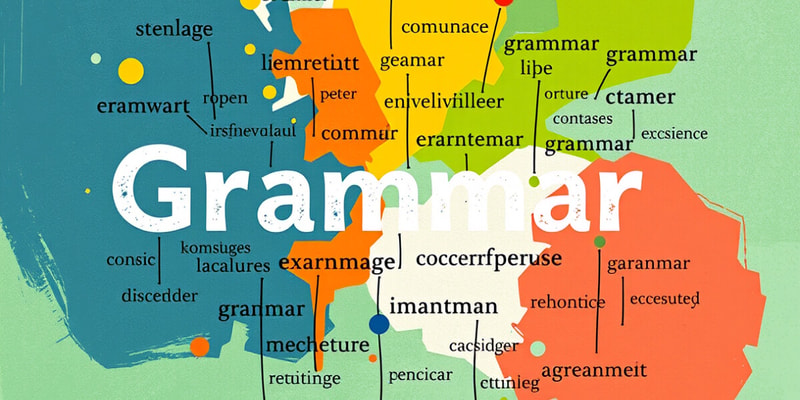Podcast
Questions and Answers
Which of the following is NOT a part of speech in English?
Which of the following is NOT a part of speech in English?
English primarily follows a Subject-Object-Verb (SOV) sentence structure.
English primarily follows a Subject-Object-Verb (SOV) sentence structure.
False
Name one factor that influences English vocabulary.
Name one factor that influences English vocabulary.
Latin, French, or Greek
English has approximately ______ vowels.
English has approximately ______ vowels.
Signup and view all the answers
Match the following dialects of English with their unique characteristics:
Match the following dialects of English with their unique characteristics:
Signup and view all the answers
Study Notes
Overview of the English Language
- English is a Germanic language originating from medieval England.
- It is a global lingua franca, widely spoken and used for international communication.
Phonetics and Phonology
- English has a variety of vowel and consonant sounds, often leading to accents and dialects.
- Phonemes: Basic units of sound; includes 12 vowels and about 24 consonants.
Grammar
- Sentence Structure: Typically follows Subject-Verb-Object (SVO) order.
-
Parts of Speech:
- Nouns: Names of people, places, or things.
- Verbs: Action or state of being.
- Adjectives: Describe nouns.
- Adverbs: Modify verbs, adjectives, or other adverbs.
- Pronouns: Replace nouns.
- Prepositions: Show relationships between nouns/pronouns and other words.
- Conjunctions: Connect words, phrases, or clauses.
Vocabulary
- Extensive lexicon influenced by Latin, French, Greek, and other languages.
- Etymology: Study of word origins; many English words have roots in other languages.
Writing System
- Uses the Latin alphabet: 26 letters (A-Z).
- Spelling can be irregular due to historical changes and foreign influences.
Dialects and Variations
- American English, British English, Australian English, and others have unique characteristics.
- Regional dialects can differ in vocabulary, pronunciation, and grammar.
Literature
- Rich literary tradition with notable authors: Shakespeare, Jane Austen, Mark Twain, and others.
- Various genres include poetry, drama, novels, and nonfiction.
Language Acquisition
- Learned through exposure, formal education, and immersion.
- A second language for millions around the world.
Current Trends
- Influenced by technology, social media, and globalization.
- New words and phrases regularly emerge; emphasis on adaptability.
Importance
- English is essential in international business, diplomacy, science, and technology.
- Widely taught and studied as a second language globally.
English Language Origins
- English originated in medieval England as a Germanic language.
- It's become a global lingua franca, widely used for communication.
Pronunciation and Sounds
- English has many vowel and consonant sounds, leading to accents and dialects.
- Basic sounds are called phonemes, with around 12 vowels and 24 consonants.
Grammar Structure
- English sentences usually follow the Subject-Verb-Object (SVO) order.
- It uses various parts of speech:
- Nouns: Name people, places, or things.
- Verbs: Indicate action or state of being.
- Adjectives: Describe nouns.
- Adverbs: Modify verbs, adjectives, or other adverbs.
- Pronouns: Replace nouns.
- Prepositions: Show relationships between nouns/pronouns and other words.
- Conjunctions: Connect words, phrases, or clauses.
Vocabulary and Etymology
- English has a vast vocabulary influenced by Latin, French, Greek, and other languages.
- Etymology studies word origins, revealing how many English words have roots in other languages.
Writing System
- English uses the Latin alphabet with its 26 letters (A-Z).
- Spelling can be irregular due to historical changes and foreign influences.
Dialects and Variations
- English dialects have unique characteristics, like American, British, and Australian English.
- Regional dialects can differ in vocabulary, pronunciation, and grammar.
English Literature
- English boasts a rich literary tradition with renowned authors such as Shakespeare, Jane Austen, and Mark Twain.
- It encompasses various genres: poetry, drama, novels, and nonfiction.
Language Acquisition
- English is acquired through exposure, formal education, and immersion.
- Millions worldwide learn it as a second language.
Current Trends
- English is constantly evolving, influenced by technology, social media, and globalization.
- New words and phrases emerge regularly, highlighting its adaptability.
Importance of English
- English is crucial in international business, diplomacy, science, and technology.
- It's widely taught and studied as a second language globally.
Studying That Suits You
Use AI to generate personalized quizzes and flashcards to suit your learning preferences.
Description
This quiz covers the fundamentals of the English language, including its origins, phonetics, grammar, and vocabulary. Explore the key components that make up this global lingua franca and understand its structure and variety.



